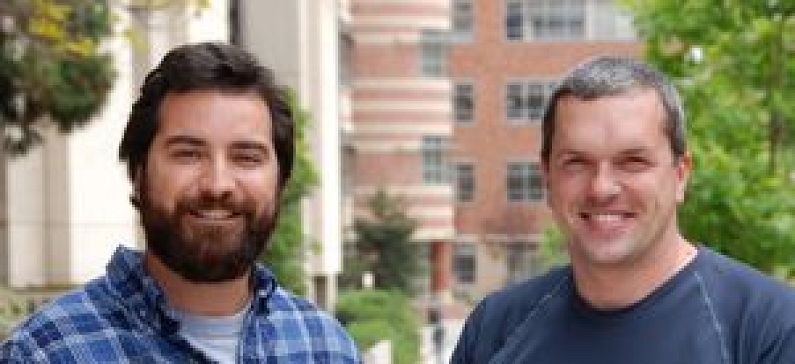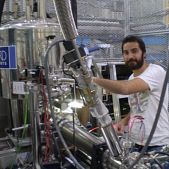
He combines Nanotechnology with high energy particle accelerators
Dimitrios Koumoulis is a UCLA Researcher and also a Researcher at Canada’s National Laboratory for Particle and Nuclear Physics (TRIUMF), in Vancouver. His research focuses on matters of advanced Physics and Chemistry having to do with semiconductors, topological insulators and Nuclear Magnetic Resonance (NMR). A great example of his research is his recent scientific paper published in the Proceedings of the National Academy of Sciences (PNAS), one of the most prestigious scientific magazines. In his paper he presents to the international scientific community a new technological method that combines for the first time Nanotechnology with high energy particle accelerators.
He was born in Alimos, Greece, in 1982. That is where his parents come from, and the place that he grew up. After highschool, he continued with his studies as a Chemical Engineer in the National Technological University of Athens (NTUA).
“As a child, I dreamt – like most of the children- of becoming an airplane pilot. But when I was in highschool, I really got interested in Chemistry, I loved experiments, labs, and one of my professors urged me to enter the Chemical Engineering Department”, says Dimitrios.
After that, he went on with postgraduate studies (masters and Ph.D.) in the science of Nanotechnology and Physics in the National Center for Scientific Research “Demokritos” and NTUA, where he graduated with the highest distinction (1st in his department), and therefore was awarded a scholarship for studying abroad. He then worked as a Researcher in Trento University (Italy), and Lodz University (Poland), in the Department of Chemistry. “I would say that the U.S. and Japan are the best countries to develop the science I preocuppy with. That is why I chose the States to continue my research. For the past 4 years I live and work as a Researcher at UCLA and also at Canada’s National Laboratory for Particle and Nuclear Physics (TRIUMF), in Vancouver”.
His research with the rest of the UCLA team is very important, as it could help scientists better understand a tiny — but potentially important — component of next-generation electronic devices. More specifically, scientists try to improve the semiconductors that power our electronic devices and for that reason they have focused on a technology called spintronics as one especially promising area of research. Unlike conventional devices that use electrons’ charge to create power, spintronic devices use electrons’ spin. The technology is already used in computer hard drives and many other applications — and scientists believe it could eventually be used for quantum computers.
“Living in the States is great beacause the conditions here are ideal for research. There is a certain convenience and great infrastructure. When you have an innovative idea all the roads are open, and you can have all the help you can get. Of course we have great scientists in Greece, but unfortunately we don’t have all the means for a better research. All the scientists that are now working for foreing universities, began their career in greek universities, and were taught by excellent greek professors” he added.










